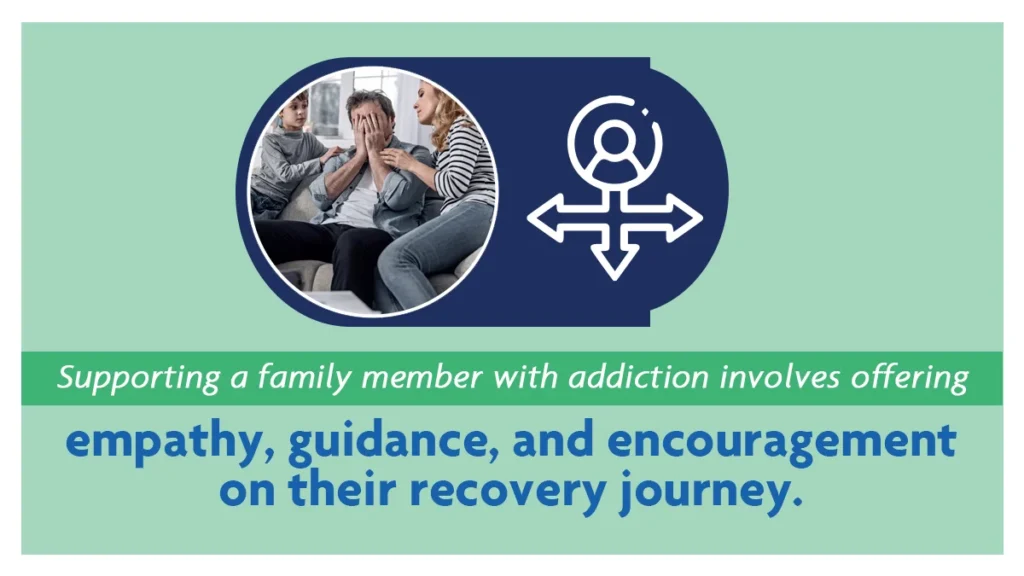Watching a family member grapple with addiction can be one of the most challenging experiences. The complexities of addiction often leave loved ones feeling helpless, overwhelmed, and unsure of how to provide meaningful support.
However, it’s essential to remember that there are ways to help and support a family member struggling with drug abuse and addiction while also taking care of yourself. Read on to explore practical strategies to assist a loved one on a recovery journey.
Key Takeaways
Understanding drug addiction and how to support a family member is crucial for effective assistance. Here’s what the article covers:
- Look for changes in behavior and physical signs as indicators that a loved one may be struggling with addiction.
- Approach the situation with empathy and encourage your loved one to seek help from medical professionals.
- Prioritizing self-care and seeking support for yourself is essential when supporting a family member with addiction.
Contact our teen treatment facility today at (845) 479-6888 to seek professional help for your child’s drug and alcohol addiction.

Signs That A Family Member Needs Help
Addiction, a chronic disease, is when someone becomes dependent on an addictive substance, like drugs or alcohol, and can’t control how much they use. This can negatively affect a person’s health, relationships, and daily life.
Recognizing when a family member needs help with substance use disorder (SUD) is essential for their well-being. Here are some signs to watch out for:
- Changes in Behavior: If you notice sudden shifts in behavior, such as mood swings, irritability, or secrecy, it could be a sign of addiction.
- Neglecting Responsibilities: Missing work, school, or important events frequently can indicate that substance use has taken priority over responsibilities.
- Financial Issues: Unexplained expenses or borrowing money, often without explanation, can signal a problem with addiction.
- Physical Changes: Weight loss, frequent illness, or neglecting personal hygiene are common signs of substance abuse.
- Relationship Problems: Strained relationships with family and friends, as well as difficulty maintaining healthy connections, may suggest addiction issues.
- Legal Troubles: Involvement in legal issues like DUIs or arrests related to substance abuse can be a clear indicator of a problem.
- Denial: If confronted, the person may deny or downplay their substance use, making it challenging to address the issue.
If you notice any of these signs in a family member, it’s important to approach them with care and concern. Please encourage them to seek professional help. Remember, addiction is a treatable medical condition, and with the right support, recovery is possible.
Approaching A Loved One With Addiction
When a loved one is battling substance addiction, it can be challenging to know where to begin in offering support. Here are some steps you can take to approach the situation effectively.
Educating Yourself About Addiction
Start by educating yourself about addiction. Understanding the nature of addiction, its causes, and its effects can assist you in approaching the situation with empathy and knowledge. Plenty of resources are available online and in books that can provide valuable insights.
Preparing for the Conversation
Before talking to your family members about their addiction:
Take some time to prepare yourself mentally.
Think about what you want to say and how you want to say it. Consider the potential reactions and emotions, and prepare to handle them calmly and compassionately.
Choosing the Right Time and Place
Pick a time and place to have the conversation where you can speak openly and without distractions. Choose a time when your affected family member will likely be sober and receptive to what you say. Avoid confronting them when they are under the influence of drugs or alcohol.
Setting Boundaries and Expectations
During the conversation, be clear about your boundaries and expectations. Tell your family members what behaviors are unacceptable and what support you will provide. Please encourage them to seek professional help and offer to assist them in finding resources and treatment options. By approaching the situation with empathy and understanding, you can offer valuable support and guidance to your loved one on their journey to recovery.
Compassionate Communication With A Love One
When it comes to helping a family member dealing with addiction, effective communication is essential. Here are some of the best ways to do so effectively.
Using Non-Judgmental Language
Using non-judgmental and understanding language can help your affected family member feel safe and supported. Avoid blaming or shaming language, and instead, focus on expressing your concerns and offering help without criticizing or condemning.
Expressing Concern And Empathy
Express your concern and empathy for your family member’s struggles. Let them know that you care about their well-being and want to support them in getting the help they need. Show genuine empathy for their experiences and emotions.
Listening Actively
Listen actively to your family members without interrupting or dismissing their feelings. Please pay attention to what they are saying and validate their experiences. Reflect on what you hear to show you understand and empathize with their perspective.
Offering Support Without Enabling
Please offer your support to your family members without enabling their addictive behaviors. This means setting boundaries and sticking to them, even if difficult. Please encourage them to seek professional help and provide valuable resources and assistance in finding treatment options.
By communicating compassionately, you can help your loved one feel understood and supported on their journey to recovery.
Encouraging A Loved One To Seek Help
When a family member is grappling with addiction, encouraging them to seek treatment and help is vital. Here are some steps you can take to support them in this journey.
Presenting Treatment Options
Begin by presenting various treatment options available to your family members. This could include behavioral therapy, counseling, family therapy programs, or support groups. Discuss the benefits of each option and help them understand that seeking help is a positive step towards recovery.
Providing Resources And Information
Provide your family members with resources and information about addiction treatment and recovery. This could include websites, pamphlets, hotlines, and books that offer valuable insights and support. Please encourage them to explore these resources at their own pace.
Offering To Accompany Them To Appointments
Offer to accompany your family member to appointments with healthcare professionals or support groups. Your presence can provide them with emotional support and reassurance during a challenging and overwhelming process.
Seeking Professional Guidance And Support Groups
Encourage your affected family member to seek professional guidance from therapists, counselors, or addiction specialists. In addition, suggest joining support groups such as Alcoholics Anonymous (AA) or Narcotics Anonymous (NA), where they can connect with other people who are going through similar experiences.
By taking these steps, you can play an important role in helping your family member struggling with addiction seek treatment and work toward recovery.
Supporting A Loved One In Their Recovery
Helping a family member through addiction recovery requires ongoing support and understanding. Here are some ways to support their journey towards a healthier lifestyle.
Creating a Supportive Environment
Create a supportive environment at home by removing triggers and temptations that may contribute to relapse. Offer encouragement and understanding, and let your family member with addiction know that you are there for them every step of the way.
Encouraging Healthy Habits
Encourage your affected family members to adopt healthy habits that support their recovery, such as regular exercise, nutritious eating, and getting enough sleep. These habits can improve their physical and mental well-being, making it easier for them to stay on the right track.
Understanding Relapse and Resilience
Understand that relapse is a common part of the recovery process and doesn’t mean failure. Offer reassurance and support if your family member experiences a setback, and help them focus on learning from the experience and moving forward with resilience.
Celebrating Milestones and Successes
Celebrate your family member’s milestones and successes along their recovery journey. Whether it’s a day sober, completing a treatment program, or achieving a personal goal, acknowledge their progress and show pride in their efforts.
By offering consistent support, you can help your loved one navigate the challenges of addiction recovery and build a fulfilling life free from addiction.
Taking Care Of Yourself
Supporting a family member with substance addiction can be emotionally taxing, but there are various ways to help you take care of yourself along the way.
Setting Boundaries For Self-Care
Setting boundaries is vital for maintaining your own mental and emotional health. This might involve limiting the amount of time you spend discussing your family member’s addiction or establishing boundaries around behavior that is harmful to you.
Seeking Support For Yourself
It’s okay to ask for help and support from others. Whether talking to a trusted friend or close family member, joining a support group for families struggling with addiction, or seeking therapy, reaching out for support can help you navigate the challenges you may face.
Managing Stress And Emotions
Managing stress and emotions is essential for your well-being. Finding healthy outlets for stress, such as exercise or creative activities, can help you cope more effectively. Acknowledging and processing your emotions is important rather than bottling them up.
Remembering That You Can’t Control Their Actions
Accept that you cannot control your family member’s actions or choices. You can offer support and guidance, but ultimately, they are responsible for their journey to recovery. Focus on what you can control, such as caring for yourself and providing a supportive environment.
By taking care of your overall well-being, you can be better equipped to support your loved one to overcome their drug and alcohol use disorder (AUD) and lead a happy life.
Frequently Asked Questions (FAQ)
Management strategies for drug abuse in individuals include:
- Seeking professional help from therapists or counselors.
- Attending support group meetings such as Narcotics Anonymous (NA) or SMART Recovery.
- Practicing healthy coping mechanisms like exercise and mindfulness.
- Setting and following a structured daily routine.
- Avoiding triggers and high-risk situations.
- Building a strong support network of friends and family.
- Being open and honest about struggles and challenges.
By combining these strategies, individuals can achieve and maintain long-term recovery from drug abuse and addiction.
When interacting with family members who are struggling with addiction, it’s vital to:
- Approach them with empathy, understanding, and support.
- Avoid judgmental language or criticism.
- Listen actively to their concerns and struggles.
- Please encourage them to seek medical help and offer to assist them in finding treatment options.
- Set healthy boundaries to protect yourself emotionally, but remain available to provide love and encouragement.
Remember that addiction is a complex issue, and recovery takes time and effort. By offering compassion and support, you can play a significant role in their journey towards healing.
If a family member is struggling with drug use, there are steps you can take to help. Start by educating yourself about drug addiction and available resources. Approach the situation with empathy and open communication, expressing concern for their well-being.
Please encourage them to seek help and offer to support them in finding treatment options. Set boundaries to protect yourself and other family members, but remain supportive and understanding. Remember that addiction is a multifaceted issue, and your support can make a significant difference in their recovery journey.
Empowering Teens, Inspiring Recovery
Parents, if your teen child is facing the tough battle of substance use disorder (SUD), you’re not alone. But here’s the good news: help is within reach! Our teen treatment center offers a top-notch residential rehab program designed just for them.
With individual counseling, group therapy, and family therapy sessions, we tailor our approach to meet your teen’s unique needs. From educational workshops to fun activities like art and music therapy, we provide comprehensive support every step of the way.
Don’t wait another moment to reach out. Contact us at (845) 479-6888 today! Let’s team up to give your teen the brighter, healthier future they deserve.


